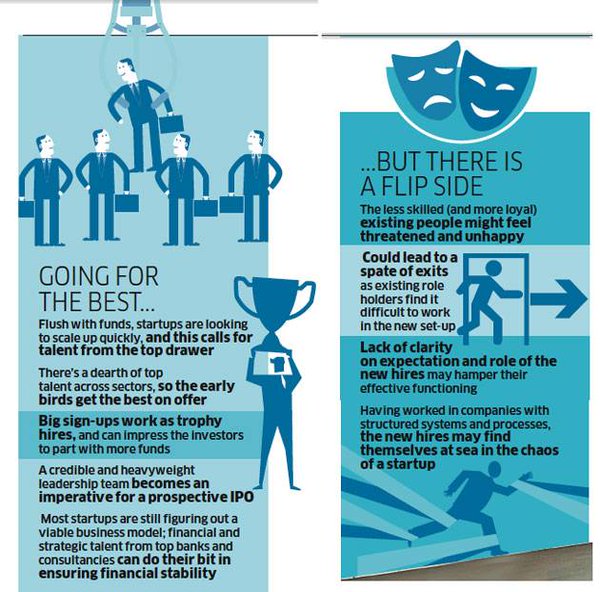“The usual and the exciting MBA jobs”
“Hi! My name is Mr. Usual. I’m a market research associate at MNC Corp. I have a desk, wear a business suit, groom myself and do a number of things in accordance with company policy. My vacations are well planned and I follow a schedule. This would make my life seem ordinary, but that would be stereotyping.
Do I wish to work in a new venture? Only if it is more rewarding than my current role, as I’m quite HAPPY with what I do.“
“Hola! I’m Mr. Exciting! I’m the market intelligence guru at Start-up Inc. A bean bag is my desk; I wear flip-flops and even track pants to work sometimes. I speak through my hair and my beard and I can be seen doing fun things, like a trek or an off-road trip, almost every weekend.
Would I switch over to a large company even if it meant giving up some of these liberties? If it allows me to do what I love in a better way, then YES!”
Mr. Usual and Mr. Exciting both agree that work is not about getting to grow your hair, but doing your bit in making the world a better place.
Each generation has its obsessions. The generation of people born in the 1980s always pointed out the fervent admiration that those from previous generations seemed to have for Government jobs. Yes, Government jobs are still coveted, but the phrase ‘MBA jobs’ was more likely to throw up images of people working at an MNC for the 80s crowd. This too has changed, and for the past 5-7 years start-ups seem to be the centerpiece of economic activity and thus start-up jobs have been getting truckloads of attention. People have started to chart out their MBA careers in a unique way.

Figure 1: Start-up employee vs MNC employee
Start-up & MNC- The same business entity in different stages of metamorphosis
To kick-off the discussion in neutral territory, let’s start by speaking out some obvious things:
- Every MNC was once a start-up
- Every start-up is trying to be an MNC
Statement no.2 might be quite controversial; some start-ups seem to thrive on not having a ‘corporate’ culture. However, everyone wants to grow and be at the top, and even though a start-up might not want to be an ‘MNC’ culturally, it will end up being one if it reaches the desired scale and scope of business activity.
Unless of course, you are a firm believer in a more socialist form of society and would seek a job at some corporations that have those principles at their core. There are a few organizations who work this way, but it is far from being the most prominent species of vocation available for a job seeker.
PRAQTISE Fact File: According to industry experts, startups face an attrition rate of 30% among mid-level employees and 40-50% among junior level employees for after MBA jobs.
How do I choose between a start-up and an MNC?
When we ponder the question ‘Which would be a better place to work?’, we are actually asking which of these would be more rewarding for us professionally. Let’s fall back on some words of wisdom by renowned bestselling author Malcolm Gladwell. This is what he said in his book ‘Outliers-The Story of Success’:
“Those three things – autonomy, complexity, and a connection between effort and reward – are, most people will agree, the three qualities that work has to have if it is to be satisfying.”
Autonomy- Will you have the power to make your own decisions?
Complexity- Will the nature of work be intellectually stimulating?
A connection between effort and reward- Will an increase in input have a corresponding effect on output?
Those three are very solid criteria to evaluate one’s job. One might come across generalizations, stating that a start-up would score better on all three parameters. It is not so simple. A number of start-ups depend on crawling the web and cold calling for generating leads, would a person performing these mundane activities necessarily feel empowered?
The idea is to evaluate the job and not the place of work to come up with a preference and this can be adopted as a first step for assessing prospective jobs after MBA. This is a completely different competitive reality than the one faced during the MBA entrance exams or even MBA exams.

Figure 2: Pros and cons of a start-up job
MBA Jobs: A Marriage of Convenience
The factors mentioned above are among the more luxurious criteria while seeking employment. Financial obligations and/or lack of opportunity are generally more dominant determinants of where you end up working.
Ask the average MBA graduate heading in to placement season, he/she is more concerned about the upcoming EMIs than uniting his/her vocation and avocation. What about someone who wants to pursue aerospace engineering, a field where opportunities are unevenly distributed on the scale of nations and not just regions? In each of these cases, the candidate would go for the best possible solution to his needs, irrespective of whether it is a start-up or an MNC.
A PRAQTICAL Look: A dynamic and changing work environment might seem to be an exciting factor while choosing a company; it might not always work out in the employees favour. A number of Indian startups (Housing.com, TinyOwl to name a few) have let employees go because of business restructuring decisions. The impact is equivalent to an established large corporation shutting down on of its operating units.
Where do we go now?
We can create an approach for choosing the right organization. Let’s take it step by step:
- Trace the career path of 10 individuals who you aspire to be like professionally. You might be surprised at how they went about reaching the sweet spot.
- Narrow down the values that matter most to you. Do you prioritise work above all else or are you an ardent believer in work-life balance? How important is integrity? What are the lines you would not cross when working for a company?
- Don’t just plan for the job you want, but the also the job you need to go through to get to the job you want. Your next job, despite being far from ideal can still be the one leads to your dream job. This piece of wisdom has an unlikely source, the movie ‘Transformers: Dark of the Moon’.
- Be prepared for a leap of faith. You might need to do something revolutionary to get where you want to be. Try and join a rival firm or take a break for getting a prized educational qualification.
Where would you rather work – Google or Zomato? JP Morgan or Paytm? Which company would teach you more? Which has better prospects of growth? What are you looking for in your next job role? The latter are better questions to find an answer to rather than worrying about what label applies to the organization being considered.
Image sources: [1] [2]
